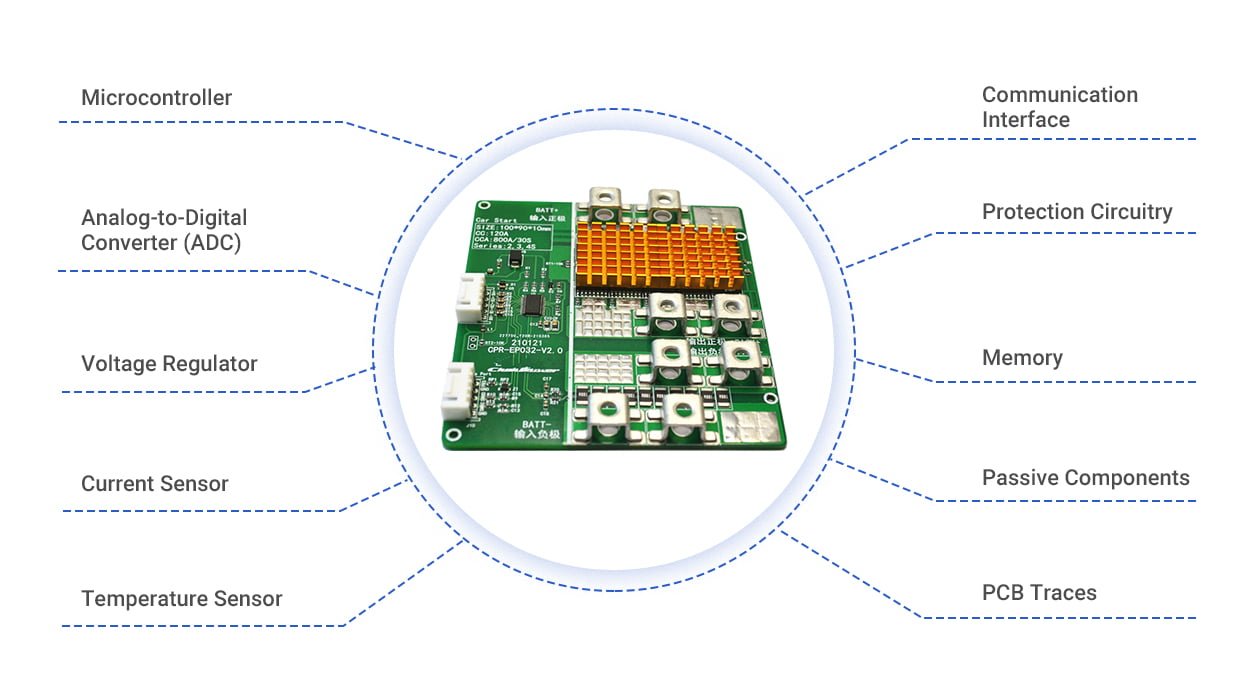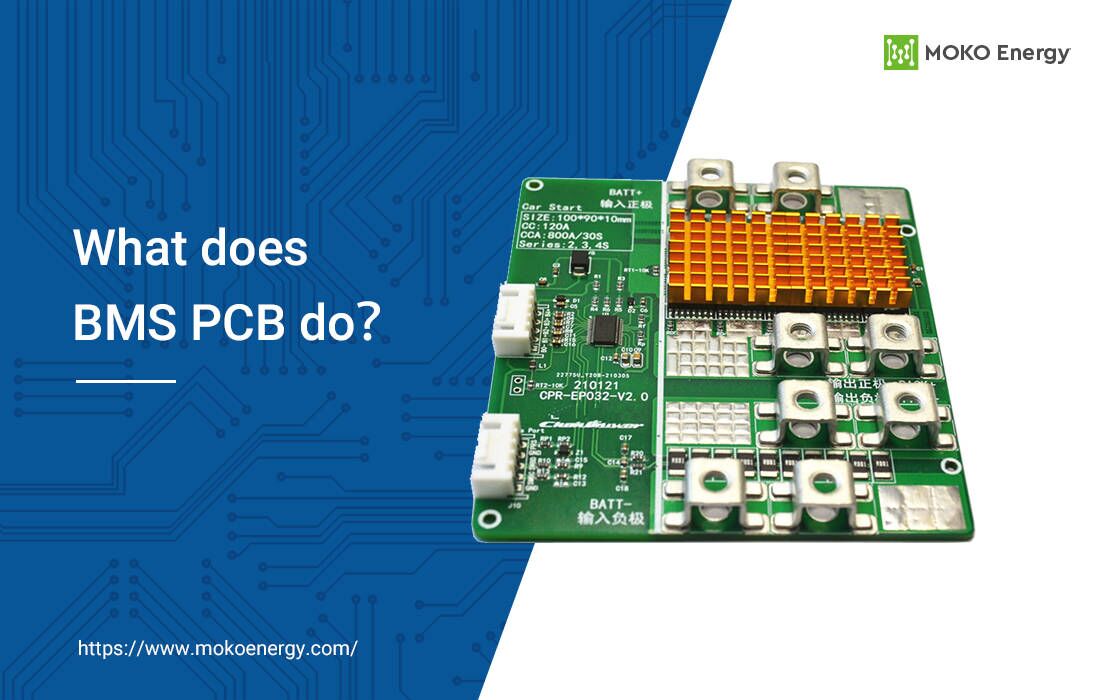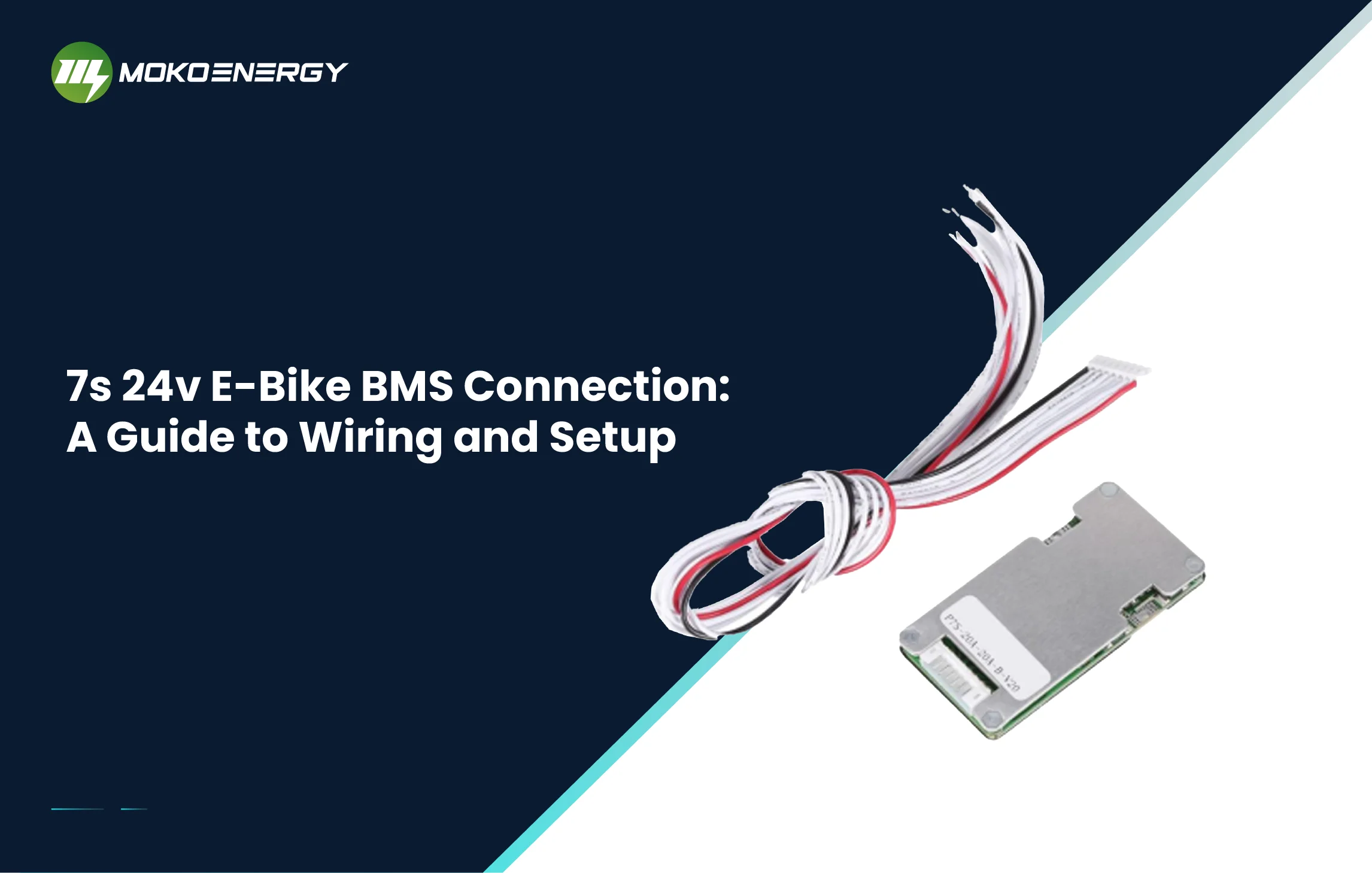Battery Management Systems (BMS) play a crucial role in guaranteeing the safety and optimizing the performance of lithium-ion batteries. BMS PCB stands for Battery Management System Printed Circuit Board. It is a crucial component of a BMS, which is responsible for monitoring and controlling the operation of a battery pack. In this article, we’ll discuss the importance of BMS PCBs, their design, manufacturing, and how to choose the right BMS PCB manufacturer. MOKOEnergy offers comprehensive BMS PCB design and manufacturing services tailored to various applications and industries.
What is BMS PCB
The BMS PCB serves as the central component of a Battery Management System, with its primary function being the monitoring, control, and protection of the battery pack. Serving as the control center of the BMS, the BMS PCB integrates various functionalities and features required for the safe and efficient management of batteries. It typically consists of a printed circuit board with electronic components and circuits designed to perform specific tasks related to battery management.
The BMS PCB operates by constantly monitoring and analyzing various parameters of the battery pack, including voltage, current, and temperature. It utilizes control logic and algorithms to make decisions based on predefined thresholds and protective measures. These decisions may include balancing cell voltages, controlling charging and discharging rates, activating protection mechanisms, and transmitting status information to external devices.
What Does a BMS PCB Consist of
The BMS PCB consists of various components that work together to monitor, control, and protect the battery pack. The specific components may vary depending on the design and functionality of the BMS, but here are some common components found in a BMS PCB, they are Microcontroller, Analog-to-Digital Converter (ADC), Voltage Regulator, Current Sensor, Temperature Sensor, Communication Interface, Protection Circuitry, Memory, Passive Components and PCB Traces.
| Component | Description |
|---|---|
| Microcontroller | Acts as the brain of the BMS PCB, controlling its functions |
| Analog-to-Digital Converter (ADC) | Converts analog signals (e.g., voltage, current) to digital form |
| Voltage Regulator | Maintains stable voltage levels for various components |
| Current Sensor | Measures the flowing current in and out of the battery pack |
| Temperature Sensor | Monitors the temperature of the battery cells or pack |
| Communication Interface | Facilitates communication with external devices |
| Protection Circuitry | Provides safety features like overcharge and over-discharge protection |
| Memory | Stores vital information about the battery system |
| Passive Components | Resistors, capacitors, inductors, etc., for stability and filtering |
| PCB Traces | Copper traces that connect the components on the PCB |
 BMS vs BMS vs PCB vs Battery PCB
BMS vs BMS vs PCB vs Battery PCB
BMS, PCB, and Battery PCB are related but distinct terms in the context of battery technology. The table below summarizes some of the differences between them:
| BMS | PCB | Battery PCB | |
|---|---|---|---|
| Purpose | Controls and monitors the battery | Provides electrical connections | Integrates battery and PCB functions |
| Function | Balances cells, regulates voltage and current, protects against overcharging and discharging | Routes electrical signals provide structural support, connect components | Combines battery management and PCB functions, monitors battery health |
| Components | Microcontroller, voltage regulators, communication modules, safety features | Conductive traces, capacitors, resistors, electronic components, connectors | Microcontroller, voltage regulators, communication modules, battery connector, conductive traces |
| Safety | Protects against overcharging, over-discharging, overheating, short circuits | No specific safety features inherent to PCB | Protects battery and PCB from faults, monitors temperature and current |
| Applications | Used in electric vehicles, energy storage systems, portable devices | Used in various electronic devices, such as smartphones, computers, IoT devices | Used in battery packs, power banks, battery-powered appliances |
In summary:
BMS is a comprehensive system that manages and monitors the operation of a battery pack, including functions like monitoring, control, and protection.
PCB is a physical board that provides a platform for connecting and supporting electronic components in a circuit.
Battery PCB refers to a specific printed circuit board designed for battery applications, focusing on protection and monitoring functions.
The BMS PCB, as part of the BMS, is the specific PCB responsible for housing the electronic components and circuits related to battery management. It plays a crucial role in monitoring and controlling the battery pack for safe and optimal performance.
Compare 3 Types of BMS PCB: Basic BMS, Mid-Level BMS, and Advanced BMS
BMS PCBs can be classified based on the number of cells they manage:
| Classification | Number of Cells | Battery Chemistry | Protection and Functionality |
|---|---|---|---|
| Basic BMS | Single-cell | Any chemistry type | Overcharge and discharge protection |
| Voltage monitoring | |||
| Mid-Level BMS | Multiple cells (2-8) | Any chemistry type | Overcharge and discharge protection |
| Voltage monitoring | |||
| Cell balancing | |||
| Temperature monitoring | |||
| Advanced BMS | Multiple cells (8+) | Any chemistry type | Overcharge and discharge protection |
| Voltage monitoring | |||
| Cell balancing | |||
| Temperature monitoring | |||
| Current monitoring | |||
| State of charge monitoring | |||
| Cell impedance monitoring | |||
| Communication interface | |||
| Diagnostics and fault detection | |||
| Energy efficiency optimization |
Who Will Need Our Products?
Various industries and individuals may require BMS PCB for their specific applications. Some notable examples include:
Electric Vehicle (EV) Manufacturers: EV manufacturers require BMS PCB to monitor and manage the battery pack in their vehicles. The BMS plays a vital role in ensuring the safe and effective operation of the battery system. It monitors vital parameters such as cell voltage, temperature, and current, and provides protection against overcharging or over-discharging of the battery.
Energy Storage Systems: Companies or individuals involved in the development of energy storage systems, such as grid-scale or residential battery systems, would need BMS PCB to control and protect the battery packs, monitor performance, and optimize energy efficiency.
Consumer Electronics: Manufacturers of portable electronic devices, like smartphones, tablets, laptops, and smartwatches, require compact BMS PCBs to manage and protect the batteries in these devices. BMS PCBs help prevent overcharging, extend battery life, and ensure safe operation.
Renewable Energy Systems: BMS PCBs are indispensable for effective battery management in various renewable energy applications, including solar energy storage systems, wind power systems, and other renewable energy installations. These PCBs monitor and control battery performance, ensuring optimal usage and safety.
Industrial Equipment: BMS PCBs are employed in various industrial equipment, including robotics, automated machinery, and material handling systems. They provide battery monitoring, protection, and control functions to optimize performance and ensure operational safety.

Factors to Consider When Choosing BMS PCB Manufacturers
When choosing a BMS PCB manufacturer, several factors should be considered to ensure the selection of a reliable and suitable supplier. Here are some key factors to consider:
Quality and Reliability: Assess the manufacturer’s reputation for producing high-quality BMS PCBs. Search for certifications, like ISO 9001, which indicate compliance with strict quality standards. Assess the reliability and performance of their products by examining customer reviews and testimonials.
Experience and Expertise: Take into account the manufacturer’s background and knowledge in the realm of battery management systems. Seek out manufacturers who have a verified history of success and possess extensive comprehension of battery technology and industry specifications.
Technical Support and After-Sales Service: Assess the extent of technical assistance and customer support offered by the manufacturer post-purchase. A reliable manufacturer should offer responsive customer support, documentation, and assistance in troubleshooting, integration, and maintenance of their BMS PCBs.
Compliance with Standards and Regulations: Make sure that the BMS PCBs provided by the manufacturer adhere to the necessary industry standards and regulations. Compliance with safety standards, such as UL or IEC, is particularly important to ensure the safety and reliability of the battery system.
Cost and Value: Assess the BMS PCB price in relation to their features, quality, and performance. Consider the overall value offered by the manufacturer, taking into account factors such as product lifespan, reliability, technical support, and customization options.
Supply Chain and Production Capacity: Evaluate the manufacturer’s supply chain capabilities and production capacity to ensure a reliable and timely supply of BMS PCBs. Take into account elements such as the time required for production, the management of inventory, and the capacity to expand production in order to meet your specific needs.
How to Choose a BMS Battery Protection Board
Based on the previous section, we have already learned how to choose a reliable supplier. In addition to that, the selection of the product itself is also crucial. Let’s take a look at the important factors to consider when choosing a product:
- Battery Chemistry: Different battery chemistries (such as lithium-ion, lead-acid, or nickel-based batteries) have specific requirements for charging, discharging, and protection. Make sure that the BMS circuit board is suitable for the specific chemistry used in your battery pack.
- Battery Voltage and Capacity: The BMS PCB should support the voltage and capacity range of your battery pack. Ensure that it can handle the voltage levels and capacity of your batteries to provide accurate monitoring and effective management.
- Number of Cells: Consider the number of cells in your battery pack. Choose a battery protection BMS PCB board that can manage the specific number of cells in your battery pack, whether it is a single-cell or multi-cell configuration.
- Balancing Functionality: If you have a multi-cell battery pack, consider whether the BMS PCB provides cell balancing functionality. Cell balancing helps equalize the charge levels of individual cells, ensuring optimal performance and extending battery life.
- Communication Interfaces: Determine if you require communication interfaces such as CAN bus, UART, or I2C for data exchange and control with external devices or systems. Check if the BMS PCB supports the communication protocols required for your application.
- Technical Support and Documentation: Verify whether the manufacturer offers extensive technical assistance and documentation for the BMS circuit board. Such support can be valuable during the integration phase and when addressing any potential problems that may occur.
- Cost: Consider the cost of the BMS PCB and ensure that it aligns with your budget. However, it is important to give priority to quality and performance rather than cost in order to guarantee the long-term dependability and safety of your battery system.
How to Test the BMS PCB Board
Conduct thorough testing of the BMS PCB, including functional tests, electrical tests, and environmental stress tests, to verify performance and reliability.
Functional tests
Conducting comprehensive testing is crucial to ensure the performance and reliability of the lithium battery BMS PCB board. Functional tests play a vital role in assessing the BMS PCB’s ability to perform its intended functions accurately. These tests should simulate various operating conditions and scenarios to evaluate features such as BMS overcurrent protection, voltage monitoring, temperature monitoring, and cell balancing. By conducting functional tests, potential issues or malfunctions can be identified and addressed early in the testing phase, ensuring that the BMS PCB meets the required performance standards.
Electrical tests
Electrical tests are another essential aspect of BMS PCB testing. These tests focus on evaluating electrical parameters and characteristics to ensure proper functionality and safety. Examples of electrical tests may include measuring insulation resistance, checking for excessive leakage current, and verifying proper connections and signal integrity. By conducting these tests, any electrical faults or shortcomings in the BMS PCB can be detected and rectified, ensuring reliable and safe operation.
Environmental stress tests
In addition to functional and electrical tests, environmental stress tests are equally important to assess the BMS PCB’s durability and performance under challenging environmental conditions. These tests subject the PCB to extremes of temperature, humidity, vibration, and shock to simulate real-world operating environments. By exposing the BMS PCB to these stressors, any weaknesses or vulnerabilities can be identified and addressed, ensuring that the PCB can withstand harsh conditions and deliver reliable performance over time.
Top 10 BMS PCB Manufacturers
Here are the top BMS PCB manufacturers to find the best fit for your specific requirements and project goals:
- OLYMPIC
- MOKOEnergy
- JinSung Electronics
- KIJOO Industrial
- Newflex
- Quickturn PCB
- Duolixin
- SIMMTECH
- YYBMS
- Zhen Ding
It’s worth noting that the industry landscape is constantly changing, and apart from these top ten companies, there are other reputable manufacturers as well. When selecting a BMS PCB manufacturer, factors such as product quality, industry reputation, certifications, technical support, and compatibility with specific battery system requirements should be considered. Perform a thorough investigation and assessment to identify the most suitable manufacturer that aligns with your requirements.
MOKOEnergy’s BMS PCB Manufacturing Service
MOKOEnergy is a reputable manufacturer with 17 years of research experience and a well-established track record in producing high-quality BMS PCBs. Specializing in battery management solutions, MOKOEnergy offers a range of BMS PCBs designed to ensure the safe and efficient operation of battery packs. Our BMS PCBs are renowned for their reliability, performance, and advanced features. Here are some specific highlights of MOKOEnergy’s BMS PCB products:
High-Quality Materials: The lithium battery protection board utilizes brand-new MOSFETs with low internal resistance and integrated chips, providing excellent performance and drop protection.
Advanced Battery Protection: The BMS PCB Board for Lithium Batteries integrates advanced protective circuitry designed to prevent issues such as overcharging, over-discharging, and short-circuiting. This feature guarantees the battery’s long-term well-being and safeguards its safety.
Compact and Lightweight: The design of the Lithium Battery BMS PCB Board prioritizes compactness and lightweight construction, making it perfectly suited for integration into mobile and portable devices. This ensures that the board meets the critical requirements of space and weight limitations in such applications.
High Energy: The lithium battery protection board has a compact design and high energy density, making it suitable for use with the 18650 ternary Li-ion cell battery protection BMS PCB Board. It features low current consumption and temperature control for efficient operation.
User-Friendly Design: The installation of the board is straightforward, accompanied by clear instructions, which ensures that it is user-friendly and can be easily utilized by a diverse set of users.
High Cost-Performance Ratio: The components of the BMS PCB are coated with a three-proof glue, providing enhanced safety and efficient heat dissipation. This ensures a high cost-performance ratio, offering excellent value for money.
Conclusion
Selecting the appropriate BMS PCB manufacturer is crucial for the success of your battery management system. By considering factors like experience, quality, and support, you can ensure that your BMS PCB meets the highest standards of performance and reliability. MOKOEnergy is a reliable partner for BMS PCB design and manufacturing, providing comprehensive solutions tailored to your specific needs. Contact us if there are any questions!
CONTINUE READING ABOUT THE BMS PCB






